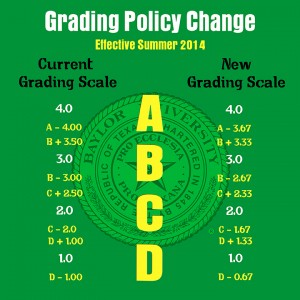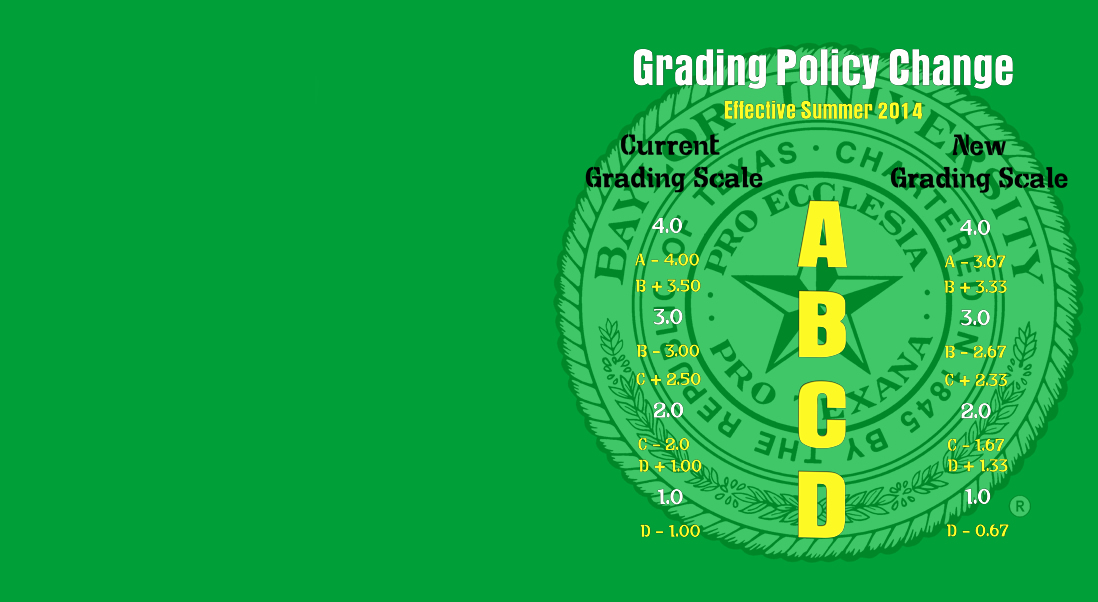
Staff Writer
Starting next summer, a new grading policy will be implemented campuswide that establishes minus grades.
While the idea of a new grading system has caused some controversy, Dr. Wesley Null, vice provost for undergraduate education, assures students that the change will not negatively affect them.
“There is no data to indicate that GPAs will go down,” Null said. “We anticipate that the change will mostly result in a wash, if you will, as far as there will be just as many faculty who will decide to go up to an A- from a B+ as those who will assign an A- instead of an A. We don’t anticipate a dramatic change in GPA.”
Currently, the grading scale has plus grades for higher B’s and C’s. These grades will still be in effect with the addition of A, B and C minuses.
George W. Truett Theological Seminary, Baylor Law School and other graduate programs will have the new scale by spring.
In a letter sent to Baylor faculty, Dr. Elizabeth Davis, executive vice president and provost, wrote the scale will provide greater consistency throughout the university since both undergraduate and graduate programs will be graded on the same scale. She said it will also give faculty more flexibility in assigning grades.
This past month marked two years since the University Undergraduate Curriculum Committee started exploring the possibility of adding minus grades to the scale.
According to the letter from Davis, the undergraduate curriculum committee’s exploration of the issue led them to recommend an implementation of minus grades to Davis and to the Faculty Senate. The Graduate Curriculum Committee and Student Senate also looked over the new grading scale proposal.
The study of this grading scale has been under way since August 2011. It was not until Feb. 9, 2012, that the undergraduate curriculum committee submitted a report on its studies. In addition to this submission to Null, the committee also offered a recommendation that the grading scale undergo a change.
The scale change was approved when presented to Faculty Senate the following November. In January, the Student Senate voted to support the change as well. Five days after, on Jan. 30, the Graduated Curriculum and Program Committee voted to have graduate courses follow the altered grading scale.
“The balance we were looking for and engaging with as faculty and students was seeing the value of our education when we graduate and the value of our diplomas and comparing that to how it would really affect our students on campus that are getting these grades,” Student Body President Wesley Hodges said.
The Student Senate debated about the minus grades and agreed that if a minus system was implemented, an A- should not be included as it is not balanced by an A+.
“The real honest debate here of why people voted in favor of implementing minus grades is that it is an effort to create additional value to our diplomas when we graduated,” Hodges said.
This new grading scale will put Baylor in line with grading scales used by other schools in the Big 12. More than half of the universities in the conference have minus grades in their policy. Baylor is the only school with the current grading scale.
“We cannot find another institution that uses our current system of awarding plus grades but no minus grades,” Null said.
A team, led by Null, met on March 26 to devise a new grading scale.
According to the registrar office’s website, professors will not be required to implement the new grading policy. The use of minuses will be left to the instructor’s discretion and students are advised to refer to class syllabi for the grading scale.
While many people support the initiative, some students such as Austin junior Brielle Boomer see negative impacts from the minus system.
“I think the new grading scale will hurt a lot of people’s grades and will make a lot of people mad,” Boomer said.
Null said he doesn’t believe the change will have a big impact on GPAs.
“I don’t think there’s going to be a dramatic impact,” Null said. “We’ve looked at other places that have made similar changes and have not seen a dramatic impact. I suspect that some students would have liked to have seen an A+ in addition to the A-. The problem with that is that an A+ goes above a 4.0 and the various committees that looked at this change decided that having a grade above a 4.0 would not be the best way to go.”
Should a student receive a C-, he or she will be allowed to retake the course without permission from a dean. The current policy states that students can only retake courses if they receive a D or F. If a student wants to retake the course after receiving a grade higher than D, he or she must have permission from a dean.






